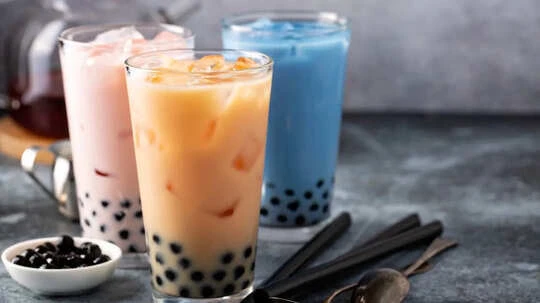Bubble tea, that irresistibly Instagrammable Taiwanese drink – with its pastel colour combinations, chewy tapioca pearls, and endless flavor combinations – has taken the world by a storm.
From being a local Taiwanese creation to a worldwide obsession, Boba tea is now as common as coffee and green tea. However, behind the aesthetic charm and sugary satisfaction, health experts are warning people about what this drink might be doing to your body.
The Lead Scare: What Is The Truth Behind These Pearls?
According to a recent investigation in the US, traces of lead in tapioca pearls were used in bubble tea. The pearls are made from cassava, which is a starchy root that naturally absorbs heavy metals like lead from the soil it is grown in. While manufacturers may not intentionally add harmful substances, the environmental contamination can easily make its way into the final product.
This is not it. The tapioca pearls also pose other risks beyond contamination. Their starchy composition means that consuming large quantities can slow stomach emptying and lead to gastroparesis. In some cases, this can lead to complete blockages.
Further this can cause nausea, vomiting and abdominal pain. These symptoms can be particularly severe in people who already have slow-moving digestion. Even guar gum, which is a thickener often added to bubble tea and harmless in small amounts, can lead to constipation if you drink it often.
The composition of this drink also effects kidney health. In 2023, Taiwanese doctors removed over 300 kidney stones from a 20-year-old woman who had been drinking bubble tea instead of water. Certain components, including oxalate and elevated phosphate levels, can also cause stone. However, it is important to note that this extreme case reflects exceptionally high consumption.
Bubble Tea Or A Sugar Bomb?
Beyond the contamination concern, there is another more visible problem: sugar. A single serving of bubble tea, which is roughly 500 ml, can contain up to 50 grams of sugar. This is twice the daily limit recommended by the World Health Organization (WHO).
That sweet, creamy taste comes at a cost. And its not a good one!
In California, this drink is considered a contributing factor to the youth obesity epidemic. The high sugar and fat content increases the likelihood of developing type 2 diabetes, obesity and metabolic disease. The prolonged consumption can contribute to fatty liver disease.
Emerging research also hint towards potential mental health implications. Studies of Chinese children who frequently consume bubble tea show an association with increased rates of anxiety and depression. Similar patterns appear in adults as well. Research on Chinese nurses found that regular bubble tea consumption was associated with anxiety, depression, fatigue, job burnout and reduced wellbeing. The same study linked lower consumption to reduced thoughts of suicide.
This does not mean that you should stop drinking it but it does suggest we treat it as an occasional indulgence instead of a daily habit.
